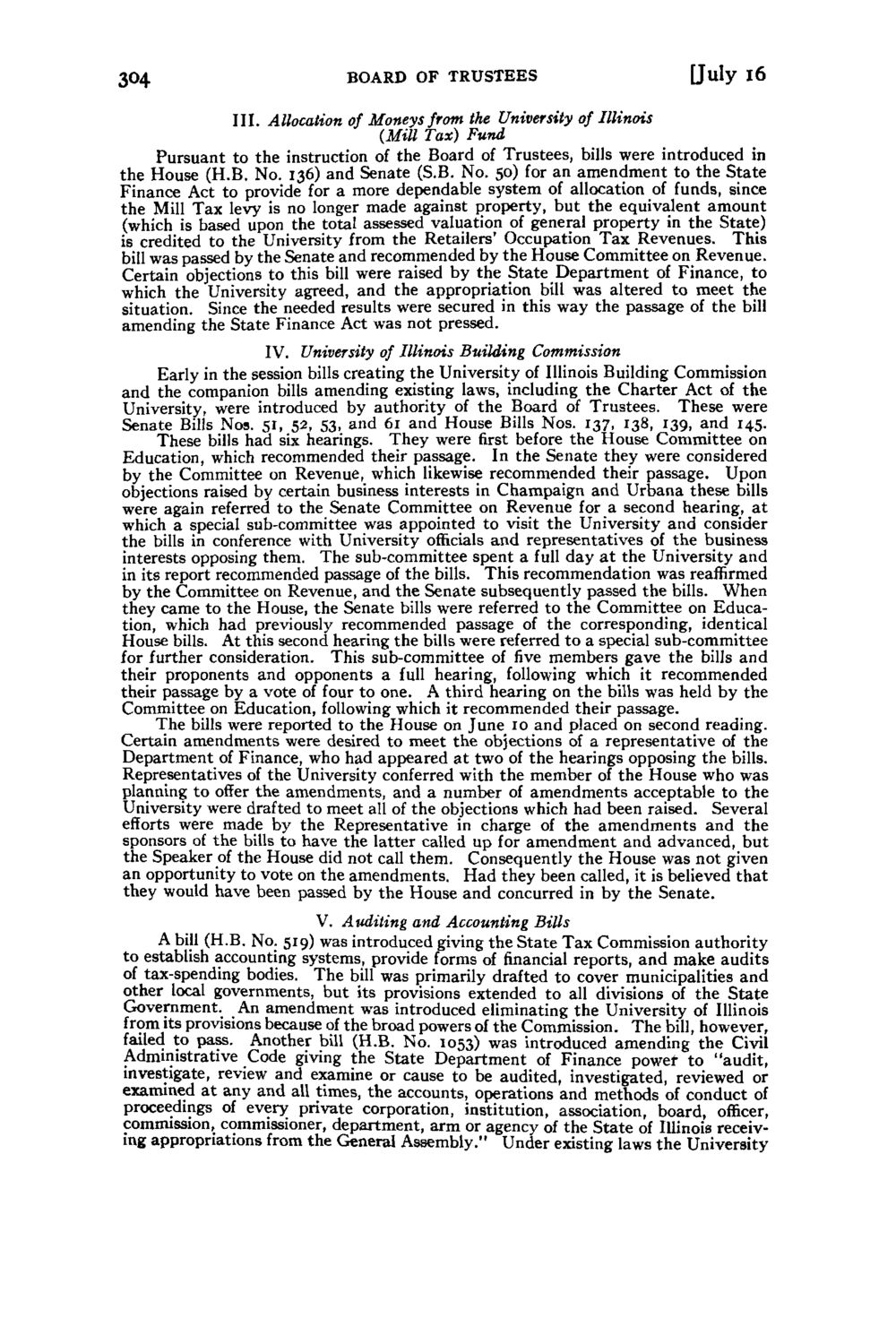| |
| |
Caption: Board of Trustees Minutes - 1938
This is a reduced-resolution page image for fast online browsing.

EXTRACTED TEXT FROM PAGE:
304 BOARD OF TRUSTEES [July 16 I I I . Allocation of Moneys from the University of Illinois (Mitt Tax) Fund Pursuant to the instruction of the Board of Trustees, bills were introduced in the House (H.B. No. 136) and Senate (S.B. No. 50) for an amendment to the State Finance Act to provide for a more dependable system of allocation of funds, since the Mill Tax levy is no longer made against property, but the equivalent amount (which is based upon the total assessed valuation of general property in the State) is credited to the University from the Retailers' Occupation Tax Revenues. This bill was passed by the Senate and recommended by the House Committee on Revenue. Certain objections to this bill were raised by the State Department of Finance, to which the University agreed, and the appropriation bill was altered to meet the situation. Since the needed results were secured in this way the passage of the bill amending the State Finance Act was not pressed. IV. University of Illinois Building Commission Early in the session bills creating the University of Illinois Building Commission and the companion bills amending existing laws, including the Charter Act of the University, were introduced by authority of the Board of Trustees. These were Senate Bills Nos. 51, 52, 53. and 61 and House Bills Nos. 137, 138, 139, and 145. These bills had six hearings. They were first before the House Committee on Education, which recommended their passage. In the Senate they were considered by the Committee on Revenue, which likewise recommended their passage. Upon objections raised by certain business interests in Champaign and Urbana these bills were again referred to the Senate Committee on Revenue for a second hearing, a t which a special sub-committee was appointed to visit the University and consider the bills in conference with University officials and representatives of the business interests opposing them. The sub-committee spent a full day a t the University and in its report recommended passage of the bills. This recommendation was reaffirmed by the Committee on Revenue, and the Senate subsequently passed the bills. When they came to the House, the Senate bills were referred to the Committee on Education, which had previously recommended passage of the corresponding, identical House bills. At this second hearing the bills were referred to a special sub-committee for further consideration. This sub-committee of five members gave the bills and their proponents and opponents a full hearing, following which it recommended their passage by a vote of four to one. A third hearing on the bills was held by the Committee on Education, following which it recommended their passage. The bills were reported to the House on June 10 and placed on second reading. Certain amendments were desired to meet the objections of a representative of the Department of Finance, who had appeared at two of the hearings opposing the bills. Representatives of the University conferred with the member of the House who was planning to offer the amendments, and a number of amendments acceptable to the University were drafted to meet all of the objections which had been raised. Several efforts were made by the Representative in charge of the amendments and the sponsors of the bills to have the latter called up for amendment and advanced, but the Speaker of the House did not call them. Consequently the House was not given an opportunity to vote on the amendments. Had they been called, it is believed that they would have been passed by the House and concurred in by the Senate. V. Auditing and Accounting Bills A bill (H.B. No. 519) was introduced giving the State Tax Commission authority to establish accounting systems, provide forms of financial reports, and make audits of tax-spending bodies. The bill was primarily drafted to cover municipalities and other local governments, but its provisions extended to all divisions of the State Government. An amendment was introduced eliminating the University of Illinois from its provisions because of the broad powers of the Commission. The bill, however, failed to pass. Another bill (H.B. No. 1053) was introduced amending the Civil Administrative Code giving the State Department of Finance power to "audit, investigate, review and examine or cause to be audited, investigated, reviewed or examined a t any and all times, the accounts, operations and methods of conduct of proceedings of every private corporation, institution, association, board, officer, commission, commissioner, department, arm or agency of the State of Illinois receiving appropriations from the General Assembly." Under existing laws the University
| |